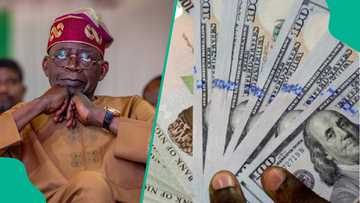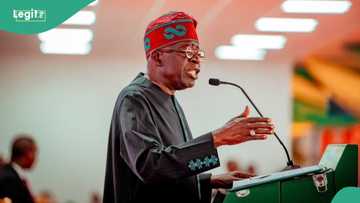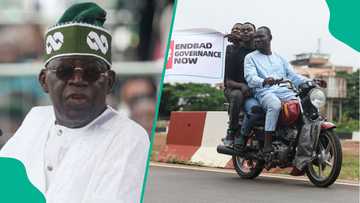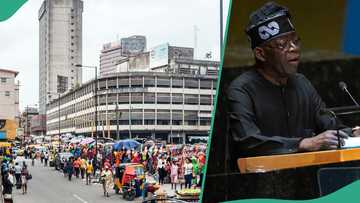Hunger Protest: Tinubu Unveils 15 Major Economic Achievements of His Administration
As the nationwide protest against hunger and hardship reached its fourth day, President Bola Ahmed Tinubu decided to address the nation.
In a 7-minute, 5-second speech to pacify angry Nigerians, Tinubu reeled out the achievements of his administration and ongoing efforts to revive the economy.
Here are the economic achievements highlighted in the speech and analysed by Legit.ng.
Removal of fuel subsidies
At the start of his administration, President Bola Tinubu announced the removal of the fuel subsidy.
This decision led to the price of fuel jumping to as high as N1,500 per litre in the black market and N850 per litre at filling stations in some states.
However, in his speech, Tinubu stressed that removing the fuel subsidy remains necessary despite protests calling for reversal.
End to multiple foreign exchange systems
Tinubu also spoke on the decision by the CBN to abolish multiple foreign exchange systems, stressing that it had constituted a noose around the economic jugular of Nigeria and impeded economic development and progress.
Increase in government revenue
Also, the president revealed that government revenues more than doubled to over N9.1 trillion in the first half of 2024.
He noted that the achievement was due to his administration's efforts at blocking leakages, introducing automation, and mobilising creatively without additional burdens on the people.
Reduction of debt service ratio
According to Tinubu, the percentage of revenue spent on debt service has decreased from 97% to 68% in the last 13 months.
Clearing of forex debt
He also highlighted that his administration successfully cleared legitimate outstanding foreign exchange obligations of about $5 billion without adverse impact on its programs for Nigerians,
Increased financial freedom:
Another achievement Tinubu mentioned is that more funds are now available to spend on essential social services like education and healthcare.
He noted that under his administration, there has been a significant increase in allocations to state and local governments from the federation account.
Infrastructure projects:
He also said his government has completed critical inherited projects, including roads, bridges, railways, power, and oil and gas developments.
One major project he highlighted as a significant achievement of his administration is the Lagos-Calabar Coastal Highway and Sokoto-Badagry Highway projects.
He believes these projects can create thousands of jobs and boost economic output.
Oil and Gas Industry
Tinubu also spoke about the increase in oil production to 1.61 million barrels per day, another significant achievement.
He further noted that his administration has been able to attract investors and sign foreign direct investments worth over half a billion dollars.
CNG initiative
The president also mentioned the launch of the CNG initiative, which he believes will help cut down transportation costs by 60% and inflation.
He also noted that his government has begun the distribution of a million kits to assist commercial vehicles with CNG conversion.
Loan support
He also mentioned the student loan scheme and revealed that N45.6 billion has already been processed for payment.
He added that the creation of the Consumer Credit Corporation with over N200 billion to help Nigerians acquire essential products.
Allocation of N50 billion Naira each for student loans and Credit Corporation from recovered proceeds of crime.
Youth-focused project
To help the youths, the president also stressed that his administration secured $620 million under the Digital and Creative Enterprises (IDiCE) program, creating millions of IT and technical jobs.
He also said his government had introduced programs like the Skill-Up Artisans Programme (SUPA), the Nigerian Youth Academy (NIYA), and the National Youth Talent Export Programme (NATEP) aimed at assisting youths.
Business focus initiative
Another achievement highlighted by Tinubu in his speech is the release of over N570 billion to states for livelihood support, and 600,000 nano-businesses benefitted from nano-grants.
He also said 75,000 beneficiaries received N1 million in micro and small business single-digit interest loans.
Another is the establishment of 10 MSME hubs, creating 240,000 jobs, with five more hubs in progress.
Support for manufacturers
He noted that his government paid N1 billion each to large manufacturers under single-digit loans to boost manufacturing output and stimulate growth.
Increase in minimum wage
The president spoke about signing the national minimum wage into law, raising the lowest earnings to at least N70,000 a month.
Housing initiative:
Another achievement highlighted is the inauguration of the first phase of the Renewed Hope City and Estate, part of six planned projects across the six geopolitical zones.
He allowed the Renewed Hope Estates in every state to complete 100,000 housing units over the next three years.
Incentives for Farmers:
Also, the president mentioned the removal of tariffs and import duties on essential food items and medical supplies for six months to drive down prices.
Additionally, distributing fertilisers and procuring mechanised farming equipment aims to increase food production and create jobs.
Expert speaks
Reacting to the President's Speech, Kelvin Umeni, an economist told Legit.ng that the speech of the president fails to address critical issues.
His words:
"I am not too pleased with everything the president said; I was expecting answers to questions about inflation. Most of the achievements mentioned by the president are not felt by the people. Inflation in Nigeria is at an all-time high, and food is becoming a luxury for Nigerians.
"I was expecting the president to talk about what his government is doing to ensure farmers return to their farms, make forex available for manufacturers, and get our refineries working."

Read also
Nigeria’s dollar bond becomes worst-performing as protesters are gunned down in hunger protest
Hunger protest: Why governors should be blamed
Legit.ng earlier reported that Nigerian governors have been accused of being responsible for allowing the economic crisis in the country to lead to the planned nationwide hunger protest.
Barrister Oladotun Hassan said that the state allocations were multiplied by the federal government following the removal of the fuel subsidy, but the governors did not let it reflect on the people.
According to Hassan, if the governors had shared what was sent to them and followed President Bola TinubuTinubu's, NigeriNigeria'sems would have been half-solved, and there would have been calls for the protest.
PAY ATTENTION: Stay Informed and follow us on Google News!
Source: Legit.ng







